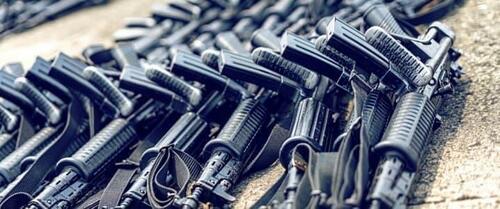Via Eurasianet.org
-
Iran International reported that Iran sold $500 million worth of arms to Armenia, a claim denied by both countries.
-
The alleged arms deal has increased tensions in the Caucasus, with Azerbaijan threatening military action and Armenia asserting its right to self-defense.
-
The situation highlights the complex geopolitical interests in the region, with Iran potentially seeking leverage over Azerbaijan and Armenia balancing ties between Iran and the West.
Allegations of Iranian double-dealing are setting the South Caucasus on edge, threatening to disrupt the Armenia-Azerbaijan peace process at a delicate stage. A tangled web of interests among all the players concerned is making it particularly difficult to separate fact from fiction in a supposed arms sale.
The intrigue traces its origins to a July 24 report by a UK-based Iranian opposition media outlet, Iran International, alleging that Tehran has sold $500 million worth of arms, including suicide drones, to Armenia. The source for the piece was “a senior military official in the Middle East” who was granted anonymity for security reasons. Iran International also reported that Iranian-Armenian cooperation involves intelligence cooperation, training “and the establishment of bases on Armenian soil.”
Iran International has generated controversy in recent years. According to an investigation published by the Guardian, the outlet has received funding from an offshore entity with links to Saudi Arabian Crown Prince Mohammed bin Salman. Meanwhile, a state-affiliated media outlet in Iran labeled Iran International as a “platform of the Zionist regime [Israel].”
Both Iranian and Armenian officials have denied the arms sale report, which seems to blend bitter Middle Eastern rivalries with an unsettled Caucasus conflict to create a potentially combustible geopolitical mixture.
The mere rumor of an arms deal caused an uproar in Azerbaijan. Caliber.Az, an outlet considered a mouthpiece for Azerbaijan’s Defense Ministry, asserted that the article was “fake news,” intended to “derail” Azerbaijani-Iranian relations. Those bilateral ties have strengthened significantly over the past year, with development of the North-South trade corridor acting as the binding agent.
“These claims are entirely fabricated,” a commentary published by Caliber.az stated.
“It appears that certain actors are intent on sabotaging the burgeoning relationship between Azerbaijan and Iran by spreading false information. This tactic mirrors past efforts to artificially create crises between the two nations.”
At the same time, the Azerbaijani government appeared to hedge its bets in case the report contained at least a grain of truth, issuing a statement the day after the publication of the Iran International account, warning that Armenia’s “systematic” provocations could cause Baku to renew military action as a means of preventing Armenian rearmament.
“The military exercises conducted by the United States in Armenia, the provision of lethal weapons to Armenia by France, and the initial phase of military aid in amount of 10 million euros provided to Armenia by the European Union under the guise of the European Peace Facility encourage the occupying state – Armenia to carry out such provocations and indicate its preparation for another war against Azerbaijan”, the statement read.
“If these provocative actions against our country are not stopped, the Armed Forces of the Republic of Azerbaijan will take necessary response measures using all means at their disposal for the purposes of self-defense,” the statement continued.
There are considerations supporting the notion that the arms-sale report is a piece of disinformation, and others that suggest it could be true. But there is no clear way to verify the information.
From Iran’s viewpoint, any such deal would seem to entail large risks and a comparatively low reward. Selling arms to Armenia would be sure to rile Azerbaijan and Russia, two key trade partners along the burgeoning North-South corridor. The strategic partnership between Russia and Armenia has collapsed over the past year as Yerevan’s allegiances have shifted Westward. Yet, the sanctions-bound Iranian government could always use the extra cash generated by a new arms deal. Such a sale could also be seen as giving Tehran additional leverage in its dealings with Azerbaijan. Baku’s close strategic relationship with Israel has long rankled Tehran.
From the Armenian perspective, the government is eager to bolster its defense capabilities in the wake of the Karabakh war and would doubtless welcome the addition of Iranian drones to its arsenal. At the same time, strategic engagement with Iran would risk upending its efforts to build closer ties to the United States and European Union.
The alleged arms deal comes at a point when peace negotiations between Armenia and Azerbaijan seem at the same time close to the finish line, but at a standstill. The Armenian Foreign Ministry, responding to the Azerbaijani statement, as well as Baku’s claims of ceasefire violations along the border, stated it was “the sovereign right of any country” to take action to defend itself.
“The Republic of Armenia does not have any other goal in the field of defense and security beyond the protection of its internationally recognized territory,” the Foreign Ministry said. “In the process of army reforms, the Republic of Armenia operates exclusively within the framework of international law.”
